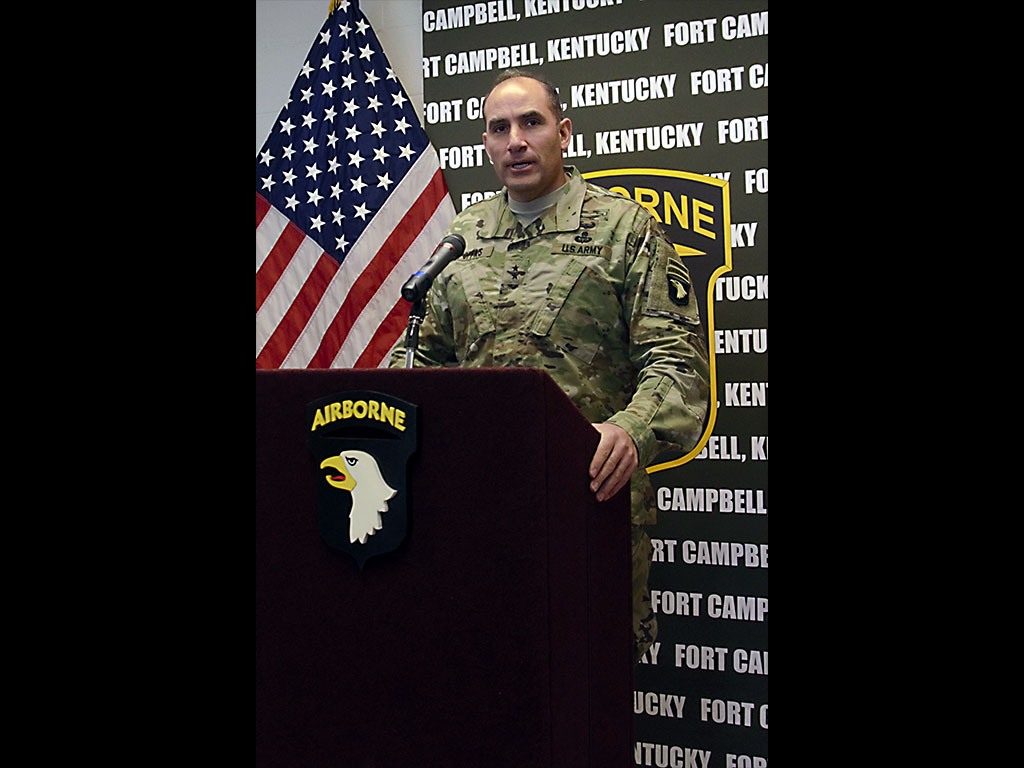Written by Leejay Lockhart
Fort Campbell Public Affairs Office
 Fort Campbell, KY – The congressional delegation that toured Fort Campbell on March 7th, 2017, held a brief press conference before returning to Washington D.C.
Fort Campbell, KY – The congressional delegation that toured Fort Campbell on March 7th, 2017, held a brief press conference before returning to Washington D.C.
The delegation included House Representatives William “Mac” Thornberry, chairman of the House Armed Services Committee; Diane Black, chairman of the House Budget Committee; Marsha Blackburn of the Tennessee 7th district which includes part of Fort Campbell, and chairman of the subcommittee on communications and technology.
Major Gen. Andrew P. Poppas, Commanding General of the 101st Airborne Division and Fort Campbell, escorted the delegation as they met with Soldiers, toured facilities and saw firsthand how budget cuts in previous years had affected readiness across the installation.

“I’m struck by two or three things from today,” Thornberry said. “No. 1 is what an important, a central role that the 101st and the other organizations stationed here at Fort Campbell perform for our country’s security every day. … Secondly, I’m struck by the damage that’s been done in the recent years by sequestration and the other activities, some of which we’ve caused from Washington, and as we talk about the training that did not take place about maintainers that were separated from their helicopters, you can see the lasting consequences from those decisions.”
Thornberry said he believes the consensus in Washington is the military has been cut too much and now is the time to repair the damage budget cuts have done to readiness. He said that growing the size of the Army is very important. “We will work together with the new administration on how to do that,” Thornberry said. “But it certainly has been helpful to me to hear firsthand, see firsthand the essential mission, and the concerns that the folks here at Fort Campbell have.”
Blackburn said the president is working with congressional leaders, and her the focus is getting the right number to stop the deterioration of capabilities.
“We know that part of that money needs to focus on the human capital, part of it is going to have to focus on redeployment training, part of it on equipment,” Blackburn said. “So, as we grow, as we rebuild, let us do it the right way and do it more holistically rather than pinning a number on the wall and saying this is the number that is really going to stick.”
Black said she appreciates the opportunity to visit post and see what the Soldiers of Fort Campbell do to defend the nation, as well as to visit both the newest and oldest building on the post.
“We will be taking this message back to all the members of our committee and I will be working with my House budget committee. Of course we’ll be working with Mac Thornberry and his committee and listening to what they are telling us,” Black said. “And we’ll take all that in consideration as we look at the bottom line.”
Poppas spoke with the press after the congressional delegation, and he said it was a great honor to host the representatives.
The military drawdown was conducted as logically as possible to reach the end strength requirements, he said. The smaller number of Soldiers has impacted readiness.
“[The drawdown] had serious implications in terms of readiness, because we had an expectation too when they made those decisions that the demand for the formations would go down,” Poppas said. “That hasn’t been the case. In fact we’ve seen the demand go up for the division from different combatant commanders and the different requirements that we have.”
To prepare for the 101st Airborne Division’s ongoing global missions, units on Fort Campbell have had to harvest money from infrastructure updates and reduce maintenance. This presents a challenge because some of the buildings on Fort Campbell were built in 1942 and some of the barracks were built in the 1970s. Additionally, the long lead time for building new infrastructure factors into what leaders have to consider.
General Daniel Allyn, the Army’s vice chief of staff, has previously said that only three of the Army’s 58 brigade combat teams are currently ready to fight tonight.
Poppas added that the 101st Abn. Div.’s three BCTs are not in that number because one has troops deployed to Afghanistan, one has troops that just returned from Iraq and is in reset, and one is committed to regionally aligned forces in Africa.
To increase the amount of Soldiers ready to fight at a moment’s notice will require more resources including more personnel and the funds to train them. The post is also lacking military construction funding for at least two years.
“Let us look at the pillars of readiness. Those pillars are all predicated on funds,” Poppas said. “The manning is predicated on funds. In order to maintain a force structure, whether it’s [450,000 Soldiers], [470,000 Soldiers] or greater you have to have the funds in order to pay for those.”



